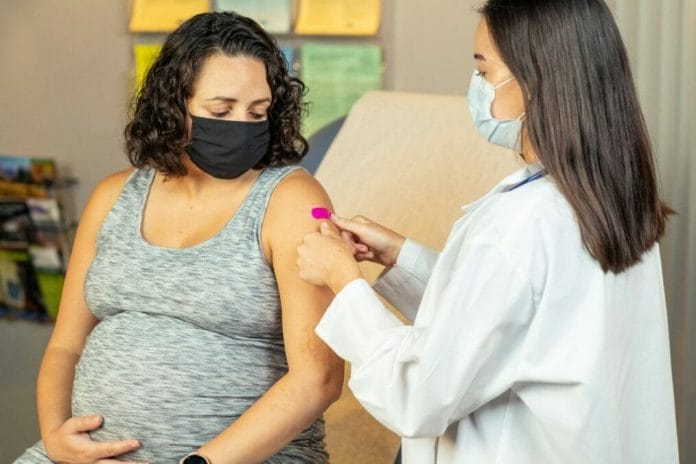
By James Gamble
Newborn babies whose mothers are vaccinated against COVID-19 are less likely to die or suffer complications, according to new research.
The study involving almost 200,000 Scandinavian moms found that babies whose mothers were vaccinated fared better than those whose mothers were not.
The study, published in the journal JAMA, serves as proof that vaccines are not only safe for pregnant women but could even potentially offer some health benefits to their babies.
The results showed babies born by women who chose to be vaccinated were less likely to suffer serious complications – including death.
However, the research team admitted they couldn’t explain the benefits to the babies of vaccinated mothers and said it’s ‘unlikely’ to be a direct result of vaccination.

The study used national registers in Norway and Sweden to observe 196,470 newborns across the two nations – accounting for nearly all newborn babies of women who became pregnant after the vaccines became available.
The first baby was born in June 2021 and the last in January 2023.
All babies were followed up for at least one month or as long as they were admitted to a neonatal unit.
Nearly half (48 percent) of the mothers had been vaccinated with one or more doses of a vaccine against COVID-19.
The majority (80 percent) received the Pfizer/BioNtech vaccine whilst a fifth (20 percent) received the Moderna vaccine.
In addition to lower infant mortality, the researchers also found a lower risk of two other serious complications in infants born to mothers who had been vaccinated.

Looking at a total of 15 neonatal complications after birth, the researchers found there was a rate of 0.9 infant deaths per 1,000 births in vaccinated mothers, whereas this rate was 1.8 per 100,000 in unvaccinated mothers.
Babies who suffered bleeds to the brain were also more prevalent in unvaccinated mothers at 3.2 per 1,000 compared with 1.7 per 1,000 in vaccinated mothers.
Those who suffered brain hypoxia/ischemia – a type of brain damage caused by a lack of oxygen to the brain before or shortly after birth – were also more likely to come from unvaccinated mothers (2.7 in 1,000 births vs 1.8 in 1,000 births of vaccinated mothers).
Mikael Norman, a professor of pediatrics and neonatology at the Department of Clinical Science, Intervention and Technology at the Karolinska Institutet in Sweden and first author of the study, explained that there was no explanation as to why babies from vaccinated mothers fared better than those from unvaccinated mothers.
“We made several attempts to explain this finding,” Dr Norman explained. “A direct vaccine effect is unlikely.
“Previous studies have shown that the vaccine does not cross the placenta and that it cannot be found in umbilical cord blood.”
The researchers instead adjusted for several background factors that were unevenly distributed in the two groups of women and conducted seven different subgroup analyses of women and newborns.
“No matter how we look at it, the finding remains and, therefore, we cannot say what the lower risk of death among infants of vaccinated women relates to,” Dr Norman said.
“We saw lower rates of cerebral hemorrhages and hypoxia-ischemic conditions of the brain in the newborns of vaccinated than in babies of unvaccinated in pregnancy.
“The incidence of other bleedings, blood clots or inflammation in various organ systems did not differ between the groups.”
Although the pandemic is over, Dr. Norman emphasized that the results of the study are of great importance for healthcare professionals offering counseling, authorities issuing recommendations and, above all, for anyone who will become pregnant in the future.
“COVID-19 is still present in society and is probably something we will have to deal with for a long time,” he said.
“It is therefore very important for the one hundred thousand women who become pregnant every year in Sweden, and the 130 million in the world, to know that vaccination with mRNA-vaccines against COVID-19 is safe for their babies.
“We found no increased risks. If anything, infants to vaccinated women had lower risks for some severe outcomes.”
Produced in association with SWNS Talker

